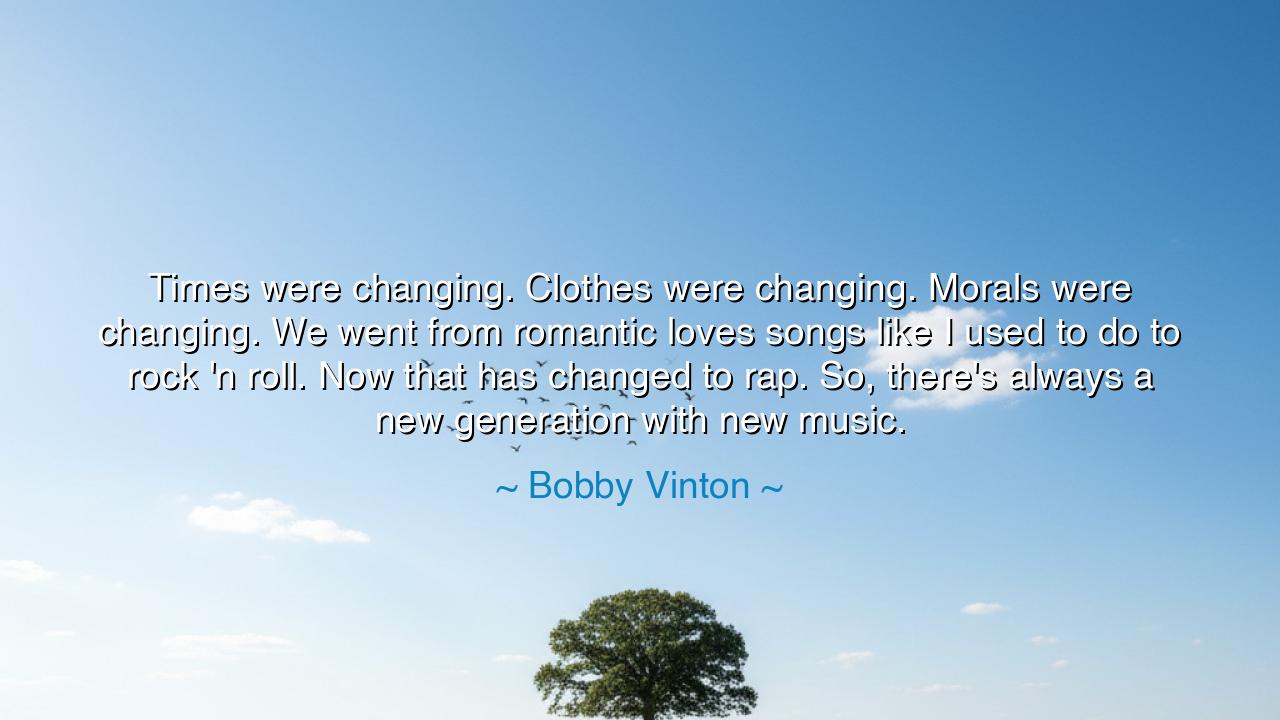
Times were changing. Clothes were changing. Morals were changing.
Times were changing. Clothes were changing. Morals were changing. We went from romantic loves songs like I used to do to rock 'n roll. Now that has changed to rap. So, there's always a new generation with new music.






Hear, O children of the earth, the words of Bobby Vinton, who speaks of the great tides of change that sweep through time, culture, and music. He said, “Times were changing. Clothes were changing. Morals were changing. We went from romantic love songs like I used to do to rock 'n roll. Now that has changed to rap. So, there's always a new generation with new music.” In these words, Vinton reveals the cyclical nature of human experience, how each generation gives birth to new expressions, creations, and beliefs that reflect the world they inhabit. Music, the very heartbeat of humanity, shifts and evolves with the times, each genre and style acting as a mirror to the society and morality of the era it arises from.
In the ancient world, music was not just entertainment, but a reflection of the soul of a civilization. Homer, in his Iliad and Odyssey, used the epic poems to reflect the values of heroism, honor, and fate that defined the Greeks. The lyre, played by the bards, was not just an instrument, but a means of passing down knowledge and shaping the culture. Each note was laden with meaning, each song a call to the gods, a reflection of the morality of the time. The song was a tool for shaping the values of the people, just as music does today. Just as Homer’s songs were bound to their time, so too is the music of each generation a reflection of its spirit and ideals.
The romantic love songs of the past, as Bobby Vinton mentions, speak to a time when emotion, idealism, and beauty dominated the hearts of those who heard them. These songs, filled with the longing of a simpler time, reflected a world where love was often viewed as the ultimate aspiration, a bond of purity and devotion. Yet, just as the world changed—clothes, morals, and values—so too did the music. The rise of rock 'n roll marked a shift not just in sound, but in the very spirit of a generation. It was a music of rebellion, of freedom, and of individuality. The generation that embraced it sought not only to challenge societal norms, but to express the complexity of a world full of turbulence and change.
Consider, O children, the rise of rock 'n roll in the 1950s. Figures like Elvis Presley and Chuck Berry became symbols of a new era, where the youth rebelled against the restraints of the previous generation, demanding their own space in the world. This music, full of energy and raw emotion, was a direct reflection of the social and cultural revolutions of the time. The sexual revolution, the civil rights movement, and the fight for freedom were all expressed through the music that echoed through the streets. The rock 'n roll revolution was not merely a shift in musical style—it was a profound expression of the changing values and morals of the era. The rebellion in the music mirrored the rebellion in the hearts of the people, a rejection of the old in favor of something new, something that better reflected their dreams and desires.
As time moves forward, so too does music. From rock 'n roll to rap, each new genre that arises is not just a shift in sound, but a shift in culture. Rap music, for example, emerged from the streets, from the voices of the marginalized, and it became a tool of expression for a new generation. It spoke not only of struggles and triumphs but of a deeper resilience, an identity that refused to be ignored. As hip-hop culture rose, it challenged the norms of society, much as rock 'n roll had done decades earlier. Each beat, each lyric, became a statement—of who the people were, of what they valued, and of what they were fighting for. Music, in this way, is always more than just entertainment. It is the voice of a generation, a cry for recognition and understanding.
The lesson here, O children, is not to see music as simply an art form, but as a reflection of the times. As generations change, so too does the music they create. But each new wave of music, like each new generation, is not an enemy of the past but an evolution of it. The romantic love songs of the past gave way to the rebellion of rock 'n roll, which gave way to the raw honesty of rap. Each form reflects the values and desires of its time, and each carries the legacy of those who came before. Just as Homer’s songs reflected the heroic ideals of ancient Greece, so too does each genre of music reflect the struggles and aspirations of the people who create it.
So, I say to you, O children, embrace the music of your time. Understand that the music of your generation, whatever it may be, is not just noise but a manifestation of your spirit, your values, and your dreams. It carries the voice of the past, yet it is always forward-looking, always evolving. Respect the music that came before, for it is the foundation upon which the music of today stands, but also celebrate the music of now, for it is the voice of your generation. In this, you will see that music, like the soul of humanity itself, is not static—it is ever-changing, ever-evolving, always a reflection of who we are and who we strive to be.






AAdministratorAdministrator
Welcome, honored guests. Please leave a comment, we will respond soon